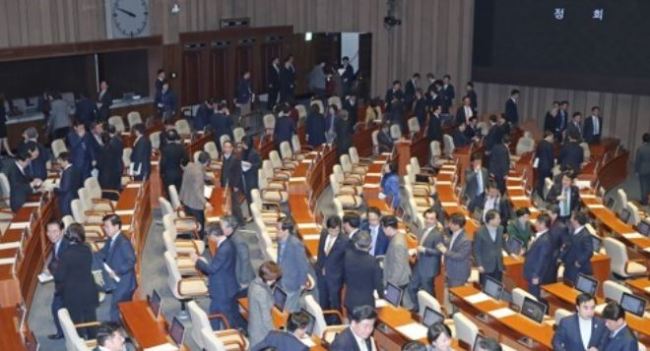National Assembly to resume session to vote on budget bill
By YonhapPublished : Dec. 5, 2017 - 11:29
The National Assembly was to resume a plenary session Tuesday night to vote on next year's government budget amid unclear prospects of its passage following the main opposition party's rejection of an earlier compromise deal.
The ruling Democratic Party sent a mobile phone text message notifying its lawmakers that the plenary session will reopen at 9 p.m. The session was adjourned earlier in the day as the main opposition Liberty Korea Party was not in attendance.
Prospects for the budget's passage were thrown into doubt after LKP lawmakers refused to endorse a compromise deal its floor leader reached a day earlier with his counterparts from the ruling party as well as the minor opposition People's Party.
LKP members raised objections mainly with the government's plan to create thousands of new public service jobs and to raise the corporate tax rate for top businesses. LKP members criticized the floor leader, Rep. Chung Woo-taik, for agreeing to the deal, and some even raised calls to boycott the National Assembly session.
The ruling Democratic Party sent a mobile phone text message notifying its lawmakers that the plenary session will reopen at 9 p.m. The session was adjourned earlier in the day as the main opposition Liberty Korea Party was not in attendance.
Prospects for the budget's passage were thrown into doubt after LKP lawmakers refused to endorse a compromise deal its floor leader reached a day earlier with his counterparts from the ruling party as well as the minor opposition People's Party.
LKP members raised objections mainly with the government's plan to create thousands of new public service jobs and to raise the corporate tax rate for top businesses. LKP members criticized the floor leader, Rep. Chung Woo-taik, for agreeing to the deal, and some even raised calls to boycott the National Assembly session.

After a heated meeting of its lawmakers, the party decided to oppose the deal altogether.
"We've concluded that we cannot support the agreement pushed for by the government and the ruling party," Chung told reporters after the meeting. "We've decided we cannot accept the entire agreement because of the issues of increasing the number of public servants and the corporate tax hike."
The LKP planned to hold another meeting of its lawmakers later Tuesday to decide whether to boycott the National Assembly session, or attend it and vote against the budget proposal.
Despite the LKP's objections, the bill can still pass if the minor opposition People's Party, which has 40 seats, joins forces with the ruling Democratic Party to vote for it. Their combined strength in the 299-member legislature is 161 seats.
Major bones of contention in the original budget bill were a proposal to use 534.9 billion won to support Moon's push to create 174,000 new public service jobs by 2022 and the 3 trillion-won "job stability" plan to bankroll next year's minimum wage increase.
Opposition parties sought to reduce the number of public sector jobs to be created, arguing that such a sharp increase would put too much of a burden on future generations. They also demanded the job stability plan be applied for only one year.
Under Monday's deal, the parties agreed on a provisional deal to set the number of new public service jobs at 9,475, down from the 12,221 initially proposed by the ruling party and the Moon Jae-in administration as part of the government's key job creation plan.
They also temporarily agreed to raise the thresholds at which businesses are subject to the highest corporate tax rate. The government originally wanted to increase it from the current 22 percent to 25 percent on those companies with taxable profit of 200 billion won or over. But the parties have now agreed that it should be levied on those with 300 billion won or higher, while agreeing to a hike of the rate to 25 percent.
The parties also agreed to set the state subsidy for smaller businesses against the burden of the planned minimum wage hike at 2.97 trillion won for next year, with the amount for the 2019 subsidy not to exceed the previous year's expenditure.
The subsidy for the minimum wage rise comes in the context of the Moon government's decision to provide financial support to make up for the costs of a sharp rise of the legal minimum hourly rate, which is increasing 16.4 percent to 7,485 won.
The proposed rise in basic pension to 250,000 won and provision of children's allowance of 100,000 won per household will come into effect starting next year in line with the government's plan, with the time of implementation and the scope of the beneficiaries to be slightly adjusted in the opposition parties' favor. (Yonhap)







![[KH Explains] Hyundai's full hybrid edge to pay off amid slow transition to pure EVs](http://res.heraldm.com/phpwas/restmb_idxmake.php?idx=644&simg=/content/image/2024/04/18/20240418050645_0.jpg&u=20240419100350)







![[From the Scene] Monks, Buddhists hail return of remains of Buddhas](http://res.heraldm.com/phpwas/restmb_idxmake.php?idx=652&simg=/content/image/2024/04/19/20240419050617_0.jpg&u=20240419175937)

![[KH Explains] Hyundai's full hybrid edge to pay off amid slow transition to pure EVs](http://res.heraldm.com/phpwas/restmb_idxmake.php?idx=652&simg=/content/image/2024/04/18/20240418050645_0.jpg&u=20240419100350)

![[Today’s K-pop] Illit drops debut single remix](http://res.heraldm.com/phpwas/restmb_idxmake.php?idx=642&simg=/content/image/2024/04/19/20240419050612_0.jpg&u=)